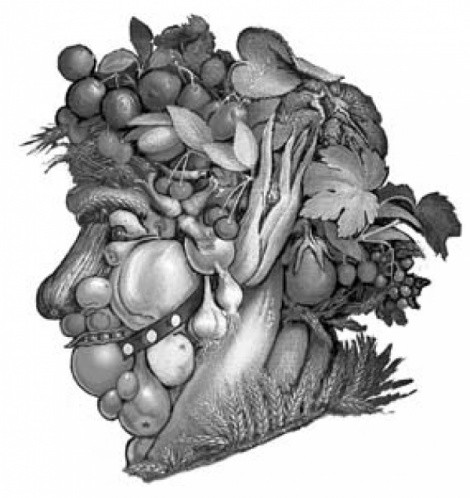
The BYU study will soon be published in The American Journal of Health Promotion which, despite its bland moniker, has become a must-read magazine—always sold in a plain brown wrapper—among food fetishists of all stripes. Look closely and you might see a rapt reader dining alone in a corner of some out-of-the-way eatery, hungrily devouring the journal along with an appetizer consisting of a single peeled cucumber resting rakishly against two organic radishes.
nThe soon-to-be-published article is certain to set the world of diet advice on its fat ear with its innovative approach to gastronomy and all its attendant arts. The Deep End, eager to give you a preview of the article, was able to track down its author, the aptly named Professor Tucker, an expert in the burgeoning field of health promotion, as well as a rising star in the Department of Food Science at Brigham Young University.
nWhen we met up with Professor Tucker at the food court in the Fashion Place Mall, he was already tucking into a huge plate of vegetables. We lost no time in launching into our interview.
nDeep End: We thought you were kidding when you said in the Deseret News article that, when you sit down to eat, you “start with a huge plate of vegetables.”
nProfessor Tucker: (between bites) I hate vegetables. I’m like, “Gag me with a spoon,” but I like to get them out of the way as soon as possible. Today, I am eating a medley of Brussels sprouts, carrots, cauliflower, broccoli, peas, green beans and zucchini. Sometimes I get sick before I finish the pile. That’s why I always carry this Tupperware container wherever I go.
nDE: You mean, to box up the leftovers?
nPT: No, to throw up in when I get sick. People appreciate it when you don’t make too much of a mess. Most of the time, I get invited back when I’m invited to dinner.
nDE: One of the most controversial remarks you made in the Deseret News was, “Eating good-tasting food is enjoyable.” Weren’t you kind of going out on a limb there? Almost like making the astonishing claim that “Having good sex is enjoyable.” Have you reconsidered your original remark?
nPT: No, I stand by my original statement. Excuse me here for a minute while I wash this sickening vegetable mash down with my Noni juice. (Gulp.) That’s better. So, what did you want to know?
nDE: You told the Deseret News—here, I have the exact quote, “Eating good-tasting food is enjoyable.”
nPT: Exacta-moan, as the French say, who happen to enjoy food to a disgusting degree. It’s because good-tasting food is enjoyable that we shouldn’t eat it. Instead, like me with my pile of vegetables, we should eat bad-tasting food. That’s at the heart, or should I say bowels, of what I call “restraint eating.”
nDE: In your interview in the Deseret News, you said, “Restraint eating takes practice.” Could you elaborate for our readers what exactly you mean by that?
nPT: I would be glad to. Initially, myself and my team of researchers experimented with a variety of restraints and bondage devices, the purpose of which was to make it difficult for eaters to eat. For instance, we tied eaters’ hands behind their backs, or occasionally employed handcuffs when our colleagues in family planning weren’t using them. Or, we used a rubber-ball device to partially gag our guinea pigs. But some unexpected problems arose.
nDE: Such as?
nPT: Well, I couldn’t tell the Deseret News people, but I can tell City Weekly. A significant portion of our volunteers actually enjoyed their food more when they were restrained. Get my drift? Anyway, we had to quickly terminate the study, especially when we were inundated by more volunteers. Word got around that we were doing some kinky stuff.
nDE: Where do things now stand in the world of restraint eating?
nPT: Vegetables, vegetables and more vegetables. Please pass me my Tupperware container. I feel sick.
nD.P. Sorensen writes satire for City Weekly.